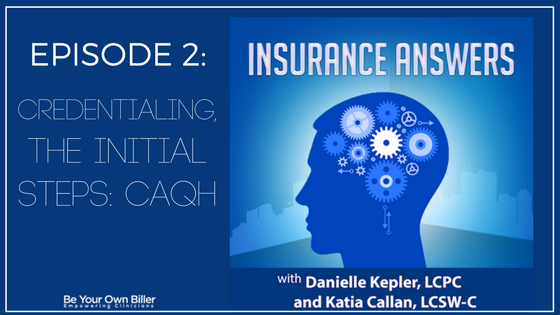I was interviewed by Simple Practice for their Spotlight Blog Series.
“Since venturing out from her group practice 9 months ago, Danielle Kepler, LCPC already has a full and profitable practice. Unlike many therapists who break out in hives at the mention of insurance billing, Danielle has gleefully embraced and is expertly navigating the process with fearless abandon in addition to sharing that expertise with others. She has used SimplePractice since day 1 to fully manage her thriving practice, including insurance billing, and as a self-described type-A personality, she wouldn’t have it any other way. Here we talk about the path of a solo, insurance-based practice and how that fits into her vision for herself and her clients.
Hi Danielle. Thanks for joining us for this week’s Spotlight! Why don’t you start by telling us a little bit about your practice.
My practice is in downtown Chicago in this really cool old historic building. I see primarily individual adults struggling with anxiety, depression and I see lots of couples too. I see about 25 clients a week and my practice is 95% insurance. I started my practice last May (2015) after I left a group practice to start my own solo practice.
What made you decide to move out of a group practice?
A couple things, actually. I just wanted more control over the business side of things and more control over the types of clients that I saw. I also wanted to make more money, rather than the flat rate I was making. I felt like as “the talent”, I deserved to be making more money. I always tell people I was born to be my own boss. I’m kind of type A.
When you launched out on your own, what did you face in terms of fear or self-doubt?
In my group practice, they handled all the referrals and they were paneled with a lot of insurance companies. I had quit the group with a steady paycheck and referral base and then it’s like, “What if no one comes see me?” I was afraid of crawling back to the group practice with my tail between my legs!
There were also a lot of fears regarding the business side of things. As part of the group, I came in and “therapized” my clients, charged the copay and I was done. The practice handled everything, including checking the insurance benefits, following up, filing the claims, all of that. So when I went my own way, I didn’t know how to file a claim or do any of that, but I quickly learned.
After being in the group, I was very stubborn and against giving anyone else a share of my profit any longer, so I wanted at least initially to do it all myself. I do it all myself now via SimplePractice for all but one of my local insurances. It was important to know how to do it all myself so if in the future I DID hire a biller, I would understand and know the lingo so that I could be aware of the process. SimplePractice really streamlines the process and makes it easy for someone like me to do it all themselves, even insurance billing.
So for you as a biz owner, it sounds like it’s very important for you to be in control of the processes?
Yes, I feel like even if I did have a biller, I’d drive them crazy. I’m always checking up on claims and I’m very on top of things. I think that makes me a successful business owner and it makes me profitable. You can’t be lazy in having your own business, which is why SimplePractice works well for me. I can log in and see all my billing stuff all there. I joke with people that the best alerts I ever receive are the SimplePractice “claim has been paid” emails.
So what would you say has been the single biggest factor for having a full practice so quickly?
Honestly, being on a lot of insurance panels. I’m on about 30 panels & EAP’s, more than the average clinician for sure. (Danielle notes she did outsource the credentialing aspect).
I’m very pro-insurance. My ideal client would want to use their insurance. I always like to think “ok, what type of therapist would I want to go to?” Since I’m self-employed, I have to pay for my own insurance 100%, and I would 100% want to go to someone who takes my insurance because I’m paying a lot for it. I like to have clients that are of the same mindset.

In therapist groups and among business coaches, we hear a lot of “don’t take insurance” talk. What is your take on that?
So I have lots of views on that and pretty much talk to my colleagues every week, who say, “I want to get off all panels. I don’t want insurance companies to tell me how to run my business.”
I understand that and that’s fine, but how I look at it and reframe it is that the insurance is paying me for that hour, maybe $60, and that’s $60 more that I made than you didn’t because you didn’t have a client at all.
So for you, it’s sort of like ‘a bird in the hand is worth 2 in the bush’.
Exactly. I’m accepting a lower fee, but that client came to me because I’m accepting their insurance. I accepted less, but I’m making more than another therapist waiting for cash pay clients who made $0 that hour.
But what about the extra work of insurance billing?
Let’s see, yesterday I had 8 clients. Billing in SimplePractice took me about 2 minutes. Click, click, done. It’s not as daunting as people can make it seem after the initial setup. What probably takes more time is writing notes. I write detailed notes, probably more than I should…or I put them off. It’s easy to distract myself when it’s time to write notes. If I really focused, it would probably take me a lot less time.
You are pretty passionate about this!
The truth is that a lot of providers that accept insurance are full because there are so many people that really need and want to use their insurance.
I actually started a Facebook group back in November called Insurance Billing and Credentialing for Therapists and Counselors. There are tons of Facebook groups talking about building your practice, but I noticed there wasn’t one that was focused on insurance credentialing and billing. People would be asking questions randomly in the business building groups. So I decided to make a group and it just blew up and now there are already 600 members in that group.
I’m also in the beginning phase of starting a business consulting business for therapists that are looking to learn the insurance billing and credentialing aspects of things. I have my website and domain and I need to just sit down and develop the content. I also recently started a podcast with a friend of mine to talk about billing and credentialing. It’s not even on iTunes yet, but we’re working on that.
Other than being a kickass therapist and insurance guru, tell us something about yourself.
I’m an avid traveler and love traveling with my husband, especially Hawaii. I also love hiking and backpacking. I’m pretty into weightlifting as well. I used to do CrossFit and that really got me into Olympic weightlifting. It just gives me a lot of confidence.
View blog post here.





